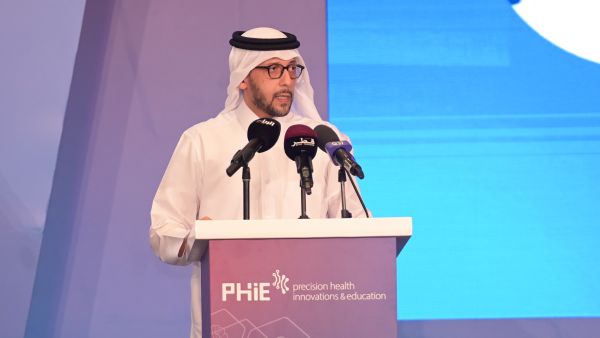PHIE-2025: WCM-Q, MoPH and MCIT congress showcases future of AI and technological innovation in healthcare

Weill Cornell Medicine-Qatar (WCM-Q), in collaboration with the Ministry of Public Health (MoPH) and the Ministry of Communications and Information Technology (MCIT), successfully hosted the prestigious PHIE-2025: AI & TECH for Enhancing Healthspans & Women’s Health Congress.
A highlight of the opening session was the keynote speech delivered by His Excellency Mansoor Bin Ebrahim Bin Saad Al Mahmoud, Minister of Public Health for Qatar. His Excellency shared Qatar’s strategic focus on advancing healthcare technologies and underscored the importance of AI in shaping the future of the nation’s healthcare landscape.
His Excellency said: “Over the past decade, and with the guidance and encouragement of our leadership, we built strong foundations for our national precision-medicine strategy: the Qatar Biobank, the Qatar Genome, high-performance computing, advanced clinical labs, and a growing team of scientists, clinicians, and data specialists. We have also worked hard to make the transition from research into clinical implementation possible and effective; allowing discovery to move from the lab to the bedside.”
He added: “Within our national strategy, we are focusing our precision health efforts on four priority areas: cancer, obesity, type 2 diabetes, and rare diseases. These conditions represent some of the largest health burdens in our society and the greatest opportunities to apply genomics and precision approaches for earlier detection, more effective treatment, and better prevention.”
The event commenced with opening remarks by Dr. Javaid Sheikh, Dean of Weill Cornell Medicine-Qatar, who emphasized the importance of fostering global collaboration in healthcare research and technological innovation. Dr. Sheikh highlighted how AI-powered precision medicine could play a pivotal role in enhancing healthspans.
Dr. Sheikh said: “The convergence of AI, precision medicine, and technological innovation provides unprecedented opportunities to improve health outcomes globally. At WCM-Q, we are proud to be at the forefront of this dialogue, particularly with regards to women’s health and optimizing healthspans. The future of healthcare is not merely about treating illness but about enhancing the overall well-being of individuals across all stages of life.”
This transformative event brought together global healthcare and tech leaders, researchers, and innovators to explore the future of healthcare, with a particular focus on precision medicine, artificial intelligence (AI), enhanced healthspans and the evolving role of women’s health in shaping global well-being.
Held over two days, the congress featured in-depth discussions, live demonstrations, and presentations of cutting-edge technologies that are revolutionizing healthcare. Key topics included AI-powered diagnostics, personalized wearables, lifestyle medicine, metabolic optimization, and the application of precision medicine to improve women’s health, mental health, and overall health outcomes worldwide. The event also provided a platform for networking and collaboration as world-renowned leaders in AI, healthcare and innovation from across the globe connected and shared their latest research and clinical experiences in utilizing new technologies for real-world applications in the healthcare sphere.
PHIE-2025 built upon the success of the 2024 congress, which was held in São Paulo, Brazil. Bringing the event to Doha emphasizes the emergence of Qatar as a thriving hub for innovation in healthcare, AI, and education.
The conference featured distinguished keynote speakers, including Dr. Emmanouil Dermitzakis, President of the Qatar Precision Health Institute and Co-founder & CEO of Antithesis Therapeutics, and Dr. Emily Capodilupo, Senior Vice President of Research, Algorithms, and Data at WHOOP.
Dr. Dermitzakis, an authority on bioinformatics, computational biology and the genetic causes and mechanisms of human disease, explored the intersection of AI, genomics, and personalized healthcare in a keynote that outlined the national vision of Qatar regarding precision health. The international panel of expert speakers also included representatives of the University of Amsterdam, Stanford University in California, Tufts University in Boston, Monash University in Melbourne, Australia, and Aspetar in Doha.
Dr. Capodilupo, recognized for her pioneering work in wearable health technology, presented on the role of personal wearables in optimizing metabolic health and overall wellness. Her address focused on how AI-powered devices are empowering individuals to take control of their health with real-time, data-driven insights.
Throughout the event, attendees had the opportunity to experience live demonstrations of cutting-edge healthcare technologies. These demonstrations showcased how these innovations are poised to revolutionize healthcare delivery, enabling more personalized, efficient, and effective treatment options for individuals worldwide. The congress also emphasized personal wellness, offering attendees yoga and breathing sessions, a quiet health zone, and a conference experience enhanced by mindful design which aimed to promote comfort, mental clarity and collaboration.
Background Information
Weill Cornell Medical College in Qatar
Weill Cornell Medicine - Qatar is a partnership between Cornell University and Qatar Foundation. It offers a comprehensive six-year medical program leading to the Cornell University M.D. degree with teaching by Cornell and Weill Cornell faculty and by physicians at Hamad Medical Corporation (HMC), Aspetar Orthopedic and Sports Medicine Hospital, the Primary Health Care Corporation, the Feto Maternal Center, and Sidra Medicine, who hold Weill Cornell appointments. Through its biomedical research program, WCM-Q is building a sustainable research community in Qatar while advancing basic science and clinical research. Through its medical college, WCM-Q seeks to provide the finest education possible for medical students, to improve health care both now and for future generations, and to provide high quality health care to the Qatari population.






